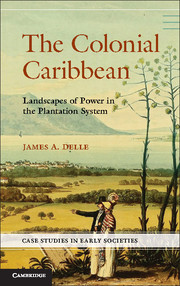Book contents
- Frontmatter
- Contents
- Figures
- Tables
- Preface
- 1 Landscapes of Power in the Colonial Caribbean
- 2 His Majesty’s Island
- 3 The Plantation Mode of Production
- 4 A Class for Itself: Regional Landscapes of the Planter Class
- 5 Contradictions and Dialectics: Village Landscapes of the Enslaved
- 6 Dialectics and Social Change: Plantation Landscapes after Slavery
- 7 Plantation Landscapes in Comparative Perspective
- 8 Conclusion
- References
- Index
8 - Conclusion
Published online by Cambridge University Press: 05 June 2014
- Frontmatter
- Contents
- Figures
- Tables
- Preface
- 1 Landscapes of Power in the Colonial Caribbean
- 2 His Majesty’s Island
- 3 The Plantation Mode of Production
- 4 A Class for Itself: Regional Landscapes of the Planter Class
- 5 Contradictions and Dialectics: Village Landscapes of the Enslaved
- 6 Dialectics and Social Change: Plantation Landscapes after Slavery
- 7 Plantation Landscapes in Comparative Perspective
- 8 Conclusion
- References
- Index
Summary
On the morning of October 23, 1865, George William Gordon was hanged in the Jamaican town of Morant Bay. Gordon, who was born the son of a white planter and an enslaved woman, had spent his youth as a free person of color. By early adulthood, he had amassed significant wealth as a merchant and rose to political prominence, being several times elected as a member of the Jamaica Assembly. In the 1840s and 1850s, seeing that the end of the plantation mode of production had not brought economic prosperity or social justice to the vast majority of Jamaica’s population, Gordon began to purchase abandoned sugar estates, subdividing and subsequently leasing them to small farmers. In the Assembly, he served as a lonely voice against the work of the planter class who still dominated the political apparatus of the island and did all they could to keep the Jamaican working class landless.
During the fateful month of October 1865, nearly 1,000 Jamaican people were killed or condemned to execution by the government of Governor Edward John Eyre, including the Assemblyman George William Gordon. Eyre was reacting to what he feared was a general uprising of the laboring classes of the island, an uprising that began as a local protest against the enforcement of laws prohibiting people from farming on abandoned plantation land. Angered by the intractability of the planter class both in the local parish governments and in the House of Assembly to address the growing poverty of the island’s people, a group of approximately 200 armed men and women marched on the vestry meeting of the parish of St. Thomas in the East, sitting at Morant Bay. A panicked militia fired into the crowd, which erupted in violence. When the dust settled, the parish courthouse was a smoldering ruin and the custos and the entire vestry of the parish of St. Thomas in the East were dead. Eyre’s response was swift and brutal. He declared martial law, unleashing the armed forces into the interior of the parish. The soldiers and militia reportedly killed men, women, and children indiscriminately, burning hundreds of houses as they went. Gordon, although no evidence existed to link him to the events in Morant Bay, was arrested at his home in Kingston, brought to Morant Bay, and after a brief military trial, hanged for treason (Heuman 1994).
- Type
- Chapter
- Information
- The Colonial CaribbeanLandscapes of Power in Jamaica's Plantation System, pp. 231 - 236Publisher: Cambridge University PressPrint publication year: 2014

